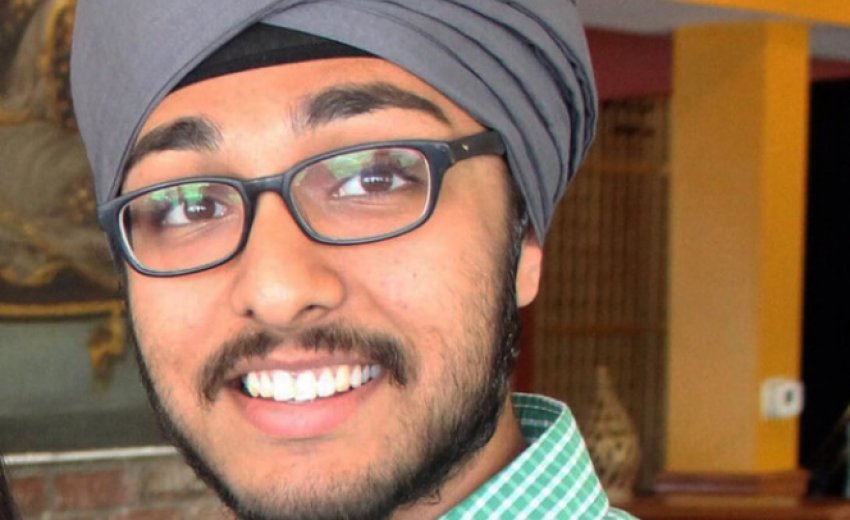January 9, 2015: "Freedom and liberty for all." That phrase, which closely follows the words from our own nation's pledge of allegiance, is one of the basic tenets of Sikhism. However, as one young Sikh man found out, the United States Army apparently doesn't think that freedom and liberty applies to Sikhs.
Iknoor Singh is a college student who has been repeatedly refused admission to the US Army’s Reserve Officer Training Corps program simply because he is a practicing Sikh. The Army is effectively giving Iknoor a choice: his country or his religion. Yet we see the US military making accommodations for other minority faiths.
One of Iknoor’s attorneys, Manmeet Singh, has transferred another Sikh principle, the duty of speaking out against injustice, into practice. I recently had the opportunity to sit down with Mr. Singh to discuss Iknoor’s case, and to learn more about Sikhism.
-Mr. Singh, I still find it surprising that many people do not know what Sikhism is; describe your religion to me.
It is the world’s fifth largest religion, which originated in Punjab, India. Sikhism is a universal religion, open to all – it recognizes and respects all human beings as equals. We do not acknowledge race, class, caste, or other earthly distinctions between people. Also, men and women are viewed as equal in all aspects of life. Our Sikh place of worship is called ‘Gurudwaara’.
-I didn’t know men and women are considered equals – how refreshing! I do know that Sikh men are to let their hair remain natural – why is that?
One of the primary means through which Sikhs practice their faith is ‘Kesh’ or uncut hair covered by a turban. However, it is important to note that Kesh is much more than just not cutting one’s hair. The significance of Kesh rests in the belief that allowing all the hair on one’s body to grow naturally is a sign of respect towards the perfection of God’s creation. For a Sikh, the practice of cutting one’s hair is an act that undermines and weakens their connection to God and to the Sikh community.
-Is the turban simply a hair accessory or is there some significance to it?
The most prominent of a Sikh’s outward appearance is the Turban. The Turban is a spiritual symbol; it is a conspicuous and public pronouncement of one’s dedication to God, the Sikh religion, and the community. 99% of the people in the world who wear turbans are Sikhs.
-Iknoor wishes to enlist in his college’s, Hofstra University, ROTC program; he has been denied four times – what is the basis?
The Army will not allow Iknoor to enlist unless he agrees to comply with the grooming and uniform rules by removing the turban he currently wears every day, cutting his hair, and shaving his beard immediately upon enlistment. Which is why Iknoor, decided to seek a religious exemption before formally enlisting as an ROTC Cadet.
-And why isn’t the ROTC program granting Iknoor a religious accommodation at this point?
First he was denied because the accommodation may have an adverse impact on readiness, unit cohesion, standards, health, safety, or discipline – but without explaining how. Iknoor was also told that exceptions are rare and decided on a case-by-case basis. In a letter from October 2014 Iknoor was advised he would have to cut his hair, remove his turban and shave his beard, all before the religious accommodation request is decided. Something he cannot do.
-I’m aware that Sikhs are predominant in the Indian military but what about in the U.S.?
In their book Civil Rights in Wartime: The Post-9/11 Sikh Experience, Dawinder S. Sidhu and Neha Singh Gohil write: “Sikhs’ military ties with the United States have been robust in the past, Bhagat Singh Thind, a Sikh immigrant, joined and fought with the U.S. army in World War I. At the end of the war he requested U.S. citizenship, but was refused. Nevertheless, more Sikhs joined the ranks of the U.S. military in World War II, and thousands of others fought alongside the United States as member of the Allied Forces. Sikh Americans participated in the Vietnam War and Operation Desert Storm. Today, Sikhs Work hand in hand with U.S. forces as UN peacekeepers or soldiers assisting with the wars in Iraq and Afghanistan.”
Sikhs have fought valiantly in wars and currently serve in militaries all over the world. In all of these occurrences, the Sikhs turbans and beards have not been of any detriment to their service. Unfortunately, Sikh-Americans are excluded from the ranks in the United States military unless they depart from some of the most fundamental practices of the Sikh faith.
-There was religious accommodation for Sikhs in the past but has that since changed?
Yes, in 1981 the United States army decided that Sikhs were no longer exempted from the army regulation that prohibited the wearing of religious or any other headgear while in uniform. This new policy was premised upon the idea that permitting such an exemption opened the door too wide for religious communities. And there weren’t any safety or security reasons for the move. However, those Sikhs already in the army were grandfathered in and permitted to retain their Sikh apparel.
-After the policy passed has the Army granted any religious exemptions to its grooming/dress rules to Sikhs?
Yes. Major Kamaljit Singh Kalsi is an active-duty physician who has been granted a religious accommodation. Maj. Kalsi maintains unshorn hair and a full-length beard. He also wears a modified turban to ensure that it does not interfere with any military or emergency equipment—the same type of turban that Iknoor Singh would wear if he were granted an accommodation. While remaining a devout Sikh, Major Kalsi was deployed to Afghanistan, where he successfully performed his duties and earned the Bronze Star Medal for resuscitating two injured soldiers. Simranpreet Singh Lamba, a combat medic, and Captain Tejdeep Singh Rattan, both Sikh adherents, were granted exemptions from the Army’s dress and grooming requirements as well.
The United Sikhs and the ACLU have filed a federal lawsuit on behalf of Iknoor, what is your hope for the outcome of this case?
We sincerely hope that Iknoor will be given an opportunity to serve his country - a country where he was born and raised, for which he has enormous respect and, is willing to put his life on the line for. Sikhs have proven time and time again that they can be Sikh, and soldier, simultaneously. History stands witness to this.
It certainly does.
_______________________________
Seema Iyer is a criminal defense & civil rights attorney with her own lawfirm in NYC. She hosts the weekly legal show "The Docket" on Shift by MSNBC.com. Seema also appears frequently on television as a legal analyst." Follow her on Twitter @seemaiyeresq
___________________________
Follow The Dean's Report on Twitter

